- Home
- Paula Byrne
Mad World: Evelyn Waugh and the Secrets of Brideshead (TEXT ONLY) Page 2
Mad World: Evelyn Waugh and the Secrets of Brideshead (TEXT ONLY) Read online
Page 2
After an appendix operation at the age of nine, he spent time convalescing with a family called Talbot who lived near the Thames Estuary. He was drawn to their stuff – a banjo, old photograph albums, a phonograph, china vases and great coats – but it was the family that really captured his affections: ‘the household was extraordinarily Dickensian, an old new world to me. I was very happy there, so happy that I neglected to write home and received a letter of rebuke from my father … I returned home and this glimpse of another world was occluded.’
From this time on, he would always be drawn to glimpsed other worlds and large, seemingly happy families. The Talbots were not rich or grand. Far from it: the money they received for Evelyn’s board and lodging was used to release furniture from the local pawnshop. The father, an unemployed old sailor, was mildly drunk every night, but he was a jolly drunk. He built the children a makeshift tree house. It was there that Evelyn and the eldest Talbot girl, Muriel, exposed their private parts to each other.
Despite the idealisation of other families, the impression persists of Evelyn as a happy boy in the ‘lustrum between pram and prep school’, collecting microscopes and air-guns, squirrelling away ‘coins, stamps, fossils, butterflies, beetles, seaweed, wild flowers’. Like most boys he went through obsessive phases, one year with his chemistry set, another with magic tricks. He was drawn to dexterity, observing the local chemist melting wax to seal paper packages and the Hampstead shopkeepers working deftly with weights and scales, shovels and canisters, paper and string: ‘Always from my earliest memories I delighted in watching things well done.’
Years later, when his Oxford friend Henry Yorke took him to his family’s factory in Birmingham, he was able to appreciate the aesthetic beauty of the industrial plant, recording in his diary how impressed he was by the ‘manual dexterity of the workers … The brass casting peculiarly beautiful: green molten metal from a red cauldron.’ This is not to say that he was drawn to the white heat of a technological future. The manual dexterity of those workers was, he said, ‘nothing in the least like mass labour or mechanisation’. Rather, it was ‘pure arts and crafts’. His delight in watching things well done was bound up with a sense of custom and tradition. As he admits in A Little Learning, he was in love with the past. He longed for the loan of a Time Machine. Not to take him to the future (‘dreariest of prospects’), in the manner of H. G. Wells, whose The Time Machine was published just a few years before he was born, but rather ‘to hover gently back through the centuries’. To go back into the past ‘would be the most exquisite pleasure of which I can conceive’.
If the adult Evelyn had travelled on his Time Machine back to the childhood of one of the aristocrats who would become his Oxford contemporaries, he would have found – and been pleased to find – that little had altered over the years. Hugh Lygon and his siblings were typical products of a system that had endured for generations. For the boys, prep school, Eton and Oxford; for the girls, very little in the way of formal education – a governess who taught in the schoolroom at home and the use of a well-stocked library were deemed to suffice.
Hugh was the second son of William Lygon, the seventh Earl Beauchamp. His early childhood was as far removed from Evelyn’s middle-class background as could be imagined: a heady cocktail of aristocracy, eccentricity and piety. Evelyn was effectively an only child once Alec went away to school; Hugh was one of seven. The Lygon family consisted of William, known from his birth in 1903 as Lord Elmley, Hugh (born 1904), Lettice (1906), Sibell (1907), Mary (1910), Dorothy (1912) and Richard (1916). They divided their time between Madresfield Court, their ancestral home nestling beneath the Malvern Hills in Worcestershire, Halkyn House, their town residence in Belgrave Square (London’s smartest address), and Walmer Castle – which genuinely was an enormous castle in Kent, the earl’s official residence in his capacity as holder of the ancient office of Warden of the Cinque Ports. The family and their immediate entourage moved between houses in their own private train.
At the time of the 1911 census, shortly before Elmley and Hugh went off to board at prep school, the household at Madresfield included a butler, a valet, three footmen, two hallboys, a housekeeper, five housemaids, a nurse, three nursery maids, a cook and four kitchen maids. A coachman and two grooms lived in the stables, while a skeleton staff of four was retained at Halkyn House.
The family were very devout and when at Madresfield they all attended Anglo-Catholic services twice a day in the chapel. All the staff had to attend too, men on the right and maids on the left, with the family in front. High Church rituals were strictly observed: the candle on the right of the altar would always be lit before the one on the left. Each child had a leather-bound prayer book with their name on it, a flower emblem engraved in gold and a loving inscription from their father.
When they were at their London home, the Lygons would cross the city every Sunday to their favourite church in Primrose Hill. Rather surprisingly, they travelled by bus and the newly opened underground railway; Lord Beauchamp in top hat and morning coat, Lady Beauchamp in satin and fur bedecked with jewels. The earl considered taxies an extravagance and thought that Sundays should be a day of rest for cars as well as horses.
The Lygon children disliked their overbearing, pious mother. Lady Beauchamp always insisted on hiring a nanny who had a neat parting precisely in the middle of her head because this reminded her of the Madonna in Renaissance paintings. She instructed the children personally in religious education. One of her daughters described her mother as ‘very odd, a religious zealot’. Within the family, she was nicknamed ‘Tomo’, because her motto was ‘Tidiness, Order, Method and Organisation’. Lady Sibell, the longest-lived of the siblings, recalled that this mantra was ‘the secret of the house and she once made me write it out a hundred times’. She also remembered her mother saying: ‘I’m right because I’m always right and anyone who says I’m wrong is mad and wicked.’
Madresfield had so many staircases that if the children heard their mother coming up one of them they ‘could be sure to go down another’. Each child found him or herself displaced from the countess’ special affections when a new baby arrived. ‘I had quite a long innings,’ said Sibell, ‘because she had a miscarriage in 1908.’
The children were encouraged to be hardy and robust, to take regular outdoor exercise. The three boys were taught boxing and lawn tennis. Hunting was encouraged for the girls (side-saddle of course) as well as the boys. Sibell was put on a horse at the age of two and grew up to become a Master of Foxhounds. When riding out, the children were always accompanied by a groom dressed in black, with polished silver buttons and a black silk top hat.
They swam regularly both at Madresfield, where there was an outdoor pool, and at Walmer Castle, which was by the sea. The water in the Madresfield pool was never changed, so must have been somewhat stagnant. Rather than being taught to swim, the children were thrown in at the deep end and told to make movements. When the ladies had departed from a swimming party, Lord Beauchamp would announce that ‘Gentlemen may lower their costumes.’
The children loved Madresfield but heartily disliked Walmer Castle, where their mother forced them to swim in the freezing sea. Sibell’s birthday was in October. ‘Tomo’ asked her what she would like to choose as a birthday treat. ‘Not to bathe today’ was Sibell’s answer. The countess replied: ‘For that you will go in twice.’ When the girl was stung by a jellyfish, ‘Mother’s cure for that was to fill a bucket with jellyfish and throw them at me.’
Apart from God, the Countess Beauchamp’s great passion in life was food. According to her daughters, she would sit alone in the blue sitting room and eat through a mound of bananas, eggs, scones, sponge cake, Gentleman’s Relish, a bunch of grapes that had to be peeled and pipped by a lackey, and thick slices of toast cut through and turned inside out. Every afternoon the baker came on his pony to deliver a loaf with a special crust. He was told not to trot because it might disturb Her Ladyship’s rest. Sibell remembered her moth
er as ‘frightfully greedy … she would eat a whole chicken for dinner’. Lady Beauchamp was conscious of her heavy figure and when a family portrait was commissioned for the twenty-first birthday of her eldest son, the painter, William Ranken, tactfully airbrushed the countess to make her into a much slimmer and more glamorous figure than she really was.
Father, Lord Beauchamp, was a very different kind of parent. Whereas the countess’ preferred birthday present for the children was a church candle, the earl tracked down beautiful wooden toys and ordered gifts from Hamley’s. For all his love of grandeur and ritual, he was a loving and, as we would now say, very ‘hands-on’ father. His absorption in the lives of his children was highly unusual for his social class and his time. He may well have been compensating for his wife’s reserve and froideur, as well as trying to be different from his own religious and strict father. The Lygon children were devoted to their nanny, as was typical of many upper-class children, but they worshipped their father.
They called him ‘Boom’, purportedly because of his loud, booming voice, which resembled the sound of the foghorns off Walmer, warning ships to keep away from the treacherous Goodwin Sands. He insisted on formality at home, wearing his blue Knight of the Garter ribbon at dinner and referring to his children by their titles, Lord Elmley for his eldest son, the Lady Lettice, the Lady Dorothy and so on. They had other names for themselves: Lady Dorothy was Coote, Mary was Maimie, Hugh was always Hughie and little Richard was Dickie.
Boom took a keen interest in his children’s education and when he was home he read to them and tried to form their literary tastes. At luncheon, the children would have to take it in turns to speak to their father in French, while a footman dressed in livery stood behind each chair. Then when the clock struck two, the sisters would enter the library, greet His Lordship and listen as he read to them from Victorian historical novels, some of which included incidents in which family ancestors had played a part.
Outside his own private rooms, close to the nursery, the earl installed small toilets and basins. As he took his morning bath, the children would chat to him about religion, art and literature, but time was always made for personal troubles such as the death of a family pet or a hunting misadventure. In the evenings, Maimie would bring her father a cocktail while he was taking his bath. Many years later Evelyn Waugh complained that his own daughter’s devotion to him did not extend this far.
Politics were rarely discussed during ablutions, but the earl’s public career was such that an interest in politics was taken as read. Lord Beauchamp impressed upon his children their long and distinguished ancestry, and the obligations and responsibilities that came with privilege. But, just as he was a Liberal in politics, so he was liberal-minded: Lady Sibell recalled that the abiding lesson that her father taught the family was ‘tolerance’. This was a value that would be needed when crisis came.
The family did not weekend at other country houses: that was considered vulgar. Maimie, Coote and Sibell read avidly and played imaginative games. They hunted for birds’ nests along the four driveways that led to Madresfield. Lady Sibell remembered being sent out by their mother to collect plovers’ eggs in the grounds of the park. It was a trial not to tread on them because they were the colour of the earth. The children played with the chickens in the poultry yard and when the butler’s disabled son came to the house in his wheelchair they would take him for a spin around the gardens. They loved animals, especially horses and dogs. Baby Dickie was pushed around the house’s extensive grounds in a black pram to which two painted horses on springs were attached. A huge rocking horse was a favourite toy: all seven children could sit on it at once.
The children tended to be dressed shabbily in hand-me-downs from cousins. Their clothes were threadbare and when they were abroad they were mistaken for charity children, which was a source of great amusement. They were encouraged to be stoical in times of illness. Doctor’s orders were that champagne was the best cure for all ailments.
Each of the children had their own nursemaid. In their early years they were schooled in the nursery on the ground floor, a spacious room with five-barred sash windows. This was Nanny’s domain. Hugh’s schoolroom chair was painted blue with forget-me-nots, Maimie’s green with snowdrops and Coote’s grey with orange blossom. A succession of governesses came and went, with alarming frequency, and included one who taught the children to play Six-Pack Bezique, another called Miss Bryan who always used the word ‘deleterious’ without really understanding what it meant, and a Swiss woman called Mademoiselle Jenny who was terrified of cows (‘so we used to get in a field and drive all the cows at her’).
The children spent their time making fun behind the adults’ backs, speaking in their nursery patois, and inventing a secret language called ‘Iggy Piggy’, which involved ‘putting an egg behind every vowel’. In later life the girls expressed resentment at their mother’s seeming indifference to their needs. Lady Sibell was left-handed but was forced by the governess to write with her right hand. Coote, the youngest girl, was constantly slapped because she had difficulty in reading. In the end, her nanny begged Lady Beauchamp to take the girl to have her eyes tested. Coote was found to be extremely short-sighted and was prescribed thick spectacles. When Maimie contracted measles and she was forbidden contact with her siblings, her diary noted that it was her father who came to her room to read to her whilst she was in quarantine.
Hugh, adored by the sisters on account of his sweet nature, was not an academically gifted child. He preferred to spend time with his beloved horses. Boom despaired of his second son’s philistinism, but appreciated his warm, sensitive nature. Hugh, unlike his brother, Lord Elmley, was entirely without pretension and airs. Everyone loved him. Blond and blue-eyed, he was a beautiful young boy with delicate features, though his father’s insistence on physical exercise made him strong and robust.
The Lygon children were extremely close to each other, united in their dislike of their mother and adulation of their father. For all the formality of its aristocratic customs and the sanctity of its religious rituals, Madresfield brimmed with vitality and a sense of community. It was a very different place from Evelyn Waugh’s Underhill.
Evelyn’s day school, Heath Mount, was within walking distance of his home in Golders Green. It was a secure and pleasant environment. A clever and imaginative boy, he was a favourite of the headmaster, Mr Granville Grenfell (‘a name which would seem implausible in fiction’). Being a favourite did not stop him fantasising that the remains of the Head’s deceased wife were hidden in a locked chamber.
Evelyn loved his prep school and, looking back, realised how lucky he was: ‘When I read the accounts of my contemporaries of the enormities enacted at their preparatory school both by masters and boys, I admit that Heath Mount ‘‘had a good tone’’’ – though it could not be denied that some of the masters ‘liked little boys too little and some too much’. There was a tendency to fondle the boys ‘in a manner just short of indecency, smacking us and pulling our hair in a manner well short of cruelty’. Evelyn himself was capable of bullying tendencies. He picked on a small and beautiful boy called Cecil Beaton: ‘the tears on his long eyelashes used to provoke the sadism of youth’.
Even at a tender age, Evelyn was attracted to seemingly glamorous and sophisticated friends. ‘I was early drawn to panache,’ he declared, recalling the sangfroid and the louche lifestyle of a little rich boy whose nanny would stand in attendance at football games in order to refresh him with lemon squash from a flask. At the cinema (which Evelyn adored), the rich boy regaled his lowly friend with filthy schoolboy jokes and lurid tales of the private lives of actresses. In return, Evelyn, who was going through a pious phase, tried to interest his friend in Anglo-Catholicism. High Church rituals had captivated him at the age of eleven. His friend, however, had more worldly things on his mind.
Waugh edited a school magazine called The Cynic. He collected war relics from the Western Front: bits of shrapnel, shell cases and a Ger
man helmet. Academic work was less of a concern. As a day school, Heath Mount did not set its sights at all high. It was not like the boarding schools that existed to feed the great public schools. Heath Mount accordingly provided insufficient preparation ‘for the endurances of adolescence’. Waugh later claimed that if he had been sent to a better prep school, he would have been clever enough to win a scholarship to Eton or Winchester. The assumption was that he would go to Sherborne: his father’s school and his brother’s, a very respectable destination, if not in the top rank beside Eton, Harrow and the rest.
In 1912, nine-year-old Lord Elmley was sent to prep school. His younger brother Hugh followed him there two years later, just after the war began. The school was a new establishment called West Downs, just outside Winchester. Owned and run by a Wykehamist called Lionel Helbert, who had previously been a House of Commons clerk, it was a small, friendly place in which the boys were treated with great care and affection. Beatings were frowned upon. The boys wore knickerbocker suits on weekdays in winter and grey flannels in summer. Sunday best was Eton suits and top hats. L. H., as Helbert was known, always took a walk after morning chapel, wearing a morning coat, and linking arms with the boys. On Sunday afternoons in summer he read stories of derring-do to the pupils out of doors, while they ate bananas and ginger biscuits.
As an Oxford undergraduate, Helbert had been very keen on drama and music. The hall in the new building at West Downs was called ‘Shakespeare’ and putting on plays was always a major part of school life – boys would be cross-dressed for The Taming of the Shrew and one appeared with a sheet over his head as the ghost in Hamlet. Madame Calviou, the French mistress, took charge of plays in French. Here Hugh’s acting talents had their first opportunity to shine.

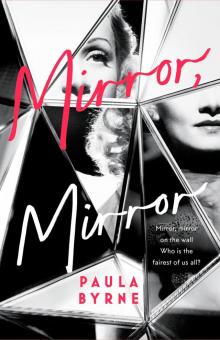 Mirror, Mirror
Mirror, Mirror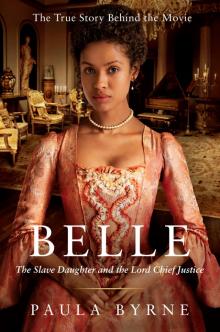 Belle
Belle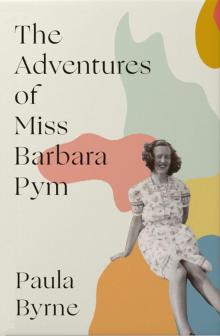 The Adventures of Miss Barbara Pym
The Adventures of Miss Barbara Pym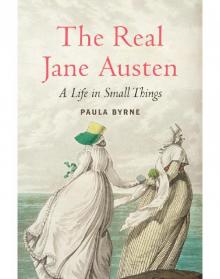 The Real Jane Austen
The Real Jane Austen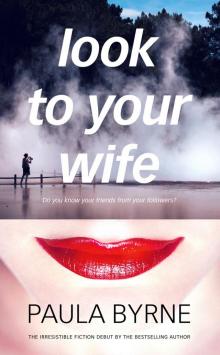 Look to Your Wife
Look to Your Wife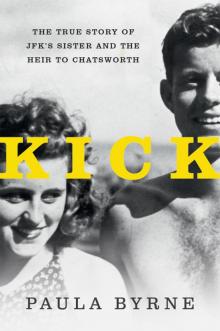 Kick
Kick Perdita
Perdita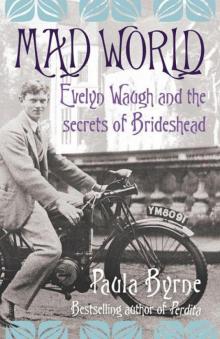 Mad World: Evelyn Waugh and the Secrets of Brideshead (TEXT ONLY)
Mad World: Evelyn Waugh and the Secrets of Brideshead (TEXT ONLY)